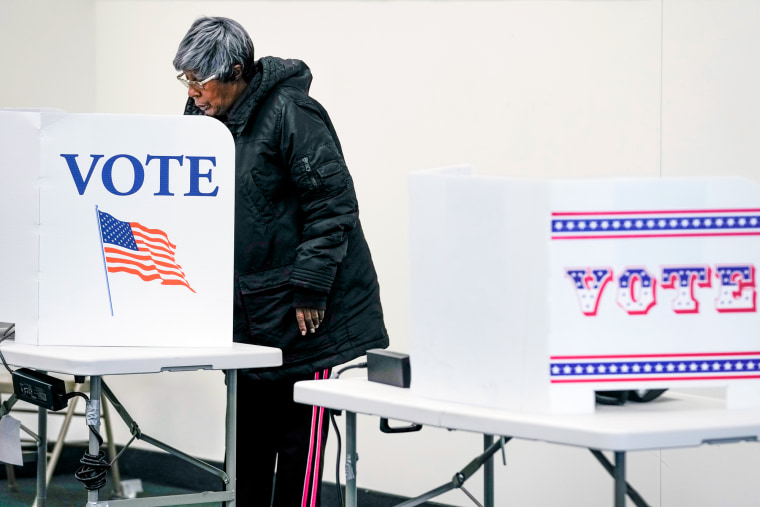Wisconsin voters will head to the polls Tuesday to decide on two low-profile yet controversial constitutional amendments backed by Republicans that would change how elections are run in the pivotal battleground state.
One measure would ban the use of private funds in election administration — which conservatives often refer to derisively as "Zuckerbucks" — while another seeks to clarify the role of an election worker.
Opponents contend that the measures are the result of unfounded conspiracy theories following Joe Biden's 2020 election win and that passing either or both of them would create obstacles to smoothly administering elections this fall, as Wisconsin is set to host key races for president and the U.S. Senate.
After the 2020 election, Donald Trump's allies falsely claimed that the millions of dollars Facebook co-founder Mark Zuckerberg donated to groups helping election administration offices was a front by Zuckerberg to help Biden win the election. In reality, the money from a group he funded was used to help hire more election workers in heavily populated areas and to buy protective gear to prevent people from getting Covid.
Critics of the ballot measure that would ban using private funds in election administration argue that those claims are the reason Republican lawmakers in Wisconsin placed the measure on the ballot Tuesday.
Wisconsin is among a handful of states where lawmakers refer proposed constitutional amendments to the ballot so voters can decide. In other states, voters can try to directly place such measures on ballots via signature-gathering processes.
Supporters say the measures would effectively ban "dark money" from elections.
A second question on the Wisconsin ballot Tuesday will ask voters to decide whether “only election officials designated by law may perform tasks in the conduct of primaries, elections, and referendums.” Opponents say that Wisconsin laws already clearly outline who qualifies as an “election official” and that the amendment would needlessly narrow the number of people who qualify accordingly, while supporters argue the law would help clarify and streamline election administration.
“Both of these are measures were passed by the Republican majority in the Legislature and vetoed by the governor. So this is what they do now. This is their end run,” said Jay Heck, the executive director of Common Cause Wisconsin, the state’s branch of the national nonpartisan government watchdog group. “They put it on the ballot in the form of an innocuous question.”
Heck called the measures “the product of election denial efforts” that, if passed, would hamper efforts by officials across the state to run elections smoothly.
Republicans in the Legislature referred the measures directly to voters after Gov. Tony Evers, a Democrat, vetoed their attempts to pass laws seeking the same outcomes.
In recent weeks, Republican lawmakers, both from Wisconsin and elsewhere, have been pushing voters to pass them.
Sen. Ron Johnson, R-Wis., whose office was involved in an attempt to deliver fake elector materials to Vice President Mike Pence on Jan. 6, 2021, urged Wisconsinites to vote “yes” on both questions, saying in a video released last week that doing so would “ban Zuckerbucks.”
Rep. Jim Jordan, R-Ohio, an ally of Trump who has pushed false claims of widespread fraud during the 2020 election, also urged voters to support the proposals in a video he released last week.
“Secure elections require proper election administration. That’s why I’m encouraging everyone in Wisconsin to vote ‘yes’ on constitutional amendments 1 and 2,” Jordan, standing alongside Rep. Bryan Steil, R-Wis., said in the video.
The Wisconsin GOP formally supports both proposals, while the state Democratic Party urges voters to oppose both.
“Seizing on Donald Trump’s lies about the 2020 election, Republican politicians in Madison are pushing a vaguely worded, bad-faith constitutional amendment to meddle in election administration and leave local governments with fewer resources to keep polling places open. Rather than work to make sure our clerks have the resources they need to run elections, Republicans are pushing a nonsense amendment to satisfy Donald Trump,” state Democratic Party Chair Ben Wikler said in a statement.
During the 2020 election, which occurred during the heart of the Covid pandemic, a group called the Center for Tech and Civic Life, a nonpartisan organization funded largely by grants from Zuckerberg and his wife, made $10 million available to Wisconsin officials to help recruit poll workers and buy protective equipment to shield people from getting sick.
Many Republicans across the U.S. have falsely claimed that the money helped boost Democratic turnout in 2020, subsequently resulting in Biden’s flipping the state from Trump, who won it in 2016.
Efforts by conservatives are also underway in Arizona to put a measure on the ballot this year that would make major changes to the state’s vote-by-mail system and in Nevada to amend the state constitution to include voter ID requirements to cast ballots.
If the measures in Wisconsin pass Tuesday, the state would join the more than two dozen others that have, fueled by the Zuckerberg conspiracy theory, taken similar actions since 2020.
According to the National Conference of State Legislatures, at least 27 states have moved to “prohibit, limit or regulate the use of private or philanthropic funding to run elections” since the 2020 election. Eleven passed such laws in 2021, 13 did so in 2022, and three passed them in 2023.
Wisconsin was among five states where Democratic governors vetoed such measures. In Wisconsin’s case, that led the GOP-controlled Legislature to refer identical measures directly to voters.
“These measures being placed before voters are part of a growing trend by the opposition to manipulate and undermine the people’s tool of direct democracy and purposefully confuse voters on a measure’s intent,” said Chris Melody Fields Figueredo, the executive director of the Ballot Initiative Strategy Center, which works with progressive organizations to help advance citizen-led ballot measures.
“We can expect these types of misleading ballot measures led by conservative lawmakers to escalate as we head further into 2024,” she added.

